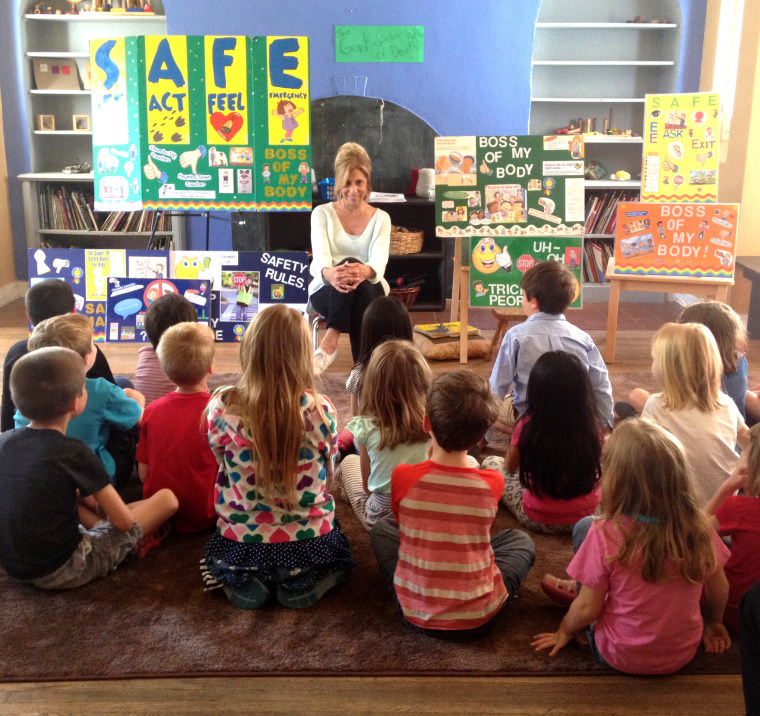Forget 'stranger danger': 'Tricky people' concept helps kids spot sketchy adults
Read how one author's advice about 'tricky people' and child safety saved a Utah mom's kids from potential abduction.
As parents to four young children, it’s always been important to Jodie Norton and her husband, Bennett, to teach their kids about staying safe. While some parents focus on the idea of “stranger danger” with their kids, Norton says her family chose to teach their kids about “tricky people” — a way of identifying dangerous people created by Pattie Fitzgerald, founder of Safely Ever After, an educational company dedicated to the prevention of childhood sexual abuse.
Norton, who blogs at Time Well Spent, wrote about how the “tricky people” concept saved her two oldest boys, then ages 10 and 8, from potential abduction. In the emergency room with a ruptured ovarian cyst, Norton asked a neighbor to pick her boys up from a bench outside of the hospital and drive them to school.
While waiting for their ride, the boys were approached by three strangers who asked the children to go into a hospital bathroom and convince their friend to be seen by a doctor. The boys felt an internal alarm saying the individuals were trying to trick or harm them, and repeatedly refused to assist them.
“Even after CJ replied, ‘No, thank you,’ they kept at them," Norton wrote in the post. "Shortly afterward, the neighbor showed up and my boys jumped in his car, but not before they saw a third adult male come out from the bathroom, jump into the car with these other three hooligans and drive off.”
Norton says her sons were able to recognize potential danger because of rules they had learned from Fitzgerald’s books, specifically those about “tricky people,” and Fitzgerald’s stance that safe adults do not ask children for help.
“Tricky people are the new strangers,” wrote Norton. “One of (Fitzgerald’s) guidelines for knowing what people are unsafe is…tricky people ask kids for help. If a safe adult needs help, they’ll ask another adult.”
Fitzgerald says she founded Safely Ever After because years of being a teacher and a mom made her aware that kids needed a way to learn about safety in simple terms that they could understand.
“Most of the time, kids are learning ‘stranger danger,’ which is cute and it rhymes, but isn’t really effective,” Fitzgerald told TODAY Parents. “'Tricky people’ is certainly more effective because most strangers are not dangerous…kids think a stranger is going to be somebody who is kind of scary looking or scary sounding, but statistically, if someone wants to harm a child they are not going to appear scary, they’re going to be charming, have an enticing offer, and seem friendly.”

“Instead of looking for the boogie man, a child should look for the person asking them to do something that doesn’t sound right or ask if the adult is trying to get them to break one of their family’s safety rules or trick them,” Fitzgerald continued. “'Tricky people’ is effective because it gets kids thinking about the situation.”
Fitzgerald says that instead of teaching “stranger danger,” parents should keep things positive and encourage kids to evaluate how a person is acting. The educator and author also suggests reviewing safety rules with kids, and teaching them to evaluate whether an adult’s request makes them feel good or bad.
“I tell kids to ask if what they’re doing gives them a ‘thumbs up’ feeling or a ‘thumbs down’ feeling,” said Fitzgerald. “We teach kids to be nice and helpful, but kids need to know when it’s OK to help and when it’s not. One of the safety rules I suggest is that safe adults never ask kids for help. If someone tells a kid, ‘I can’t find my pet,’ or ‘I need help carrying something to my car,’ for example, that’s a thumbs down until you ask first — until you check with your safe adult.”
Fitzgerald also suggests empowering kids with safety discussions, rather than frightening them. Discussions about family safety should be presented as a positive thing that is necessary because kids are getting older and are more mature and ready for the responsibility.

“We shouldn’t tell kids that there are bad people out there who want to hurt them,” cautions Fitzgerald. “Everything should be very positive.”
Norton says she is grateful for Fitzgerald’s teachings, as they may have saved her boys from a dangerous situation.
“Empowering our kids with the knowledge and strategies they need to keep themselves safe is not important in today’s world — it’s critical,” said Norton. “This experience has made me grateful we’d gone over these strategies in the past, but even more so, it’s made me determined to continue discussing them.”
Editor's note: This story was first published June 6, 2016.

